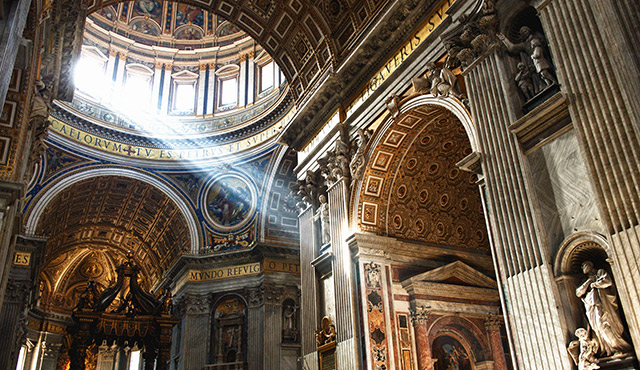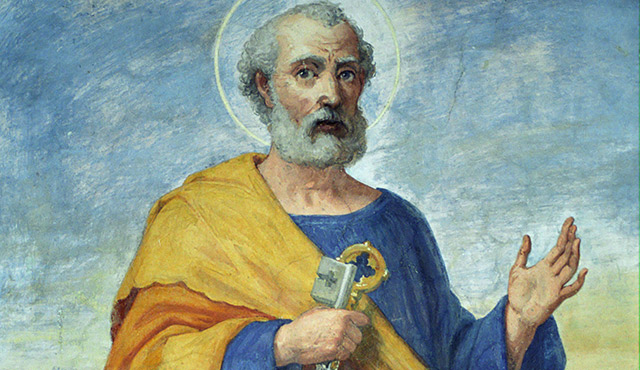Every Geometry 101 student quickly learns that the shortest way between two points is a straight line. Unfortunately, life rarely works that way. The path toward any important goal is usually wrought with unexpected twists and speed bumps, potholes and dead-end signs. For this reason, success requires determination, vision, focus, persistence and a willingness to fail.
Christ’s Apostles, His closest followers who served as the primary teachers of the gospel, had all of these qualities, and more. However, they may have ultimately failed in their quest had they lacked another component, one that many believe was – and is – the most important of all: faith.
The most significant of the historical disciples, the Apostles were individually selected by Jesus to carry His mission. As such, His closest and most devoted followers were given the authority and power to heal the sick and forgive sins. During the first century, these Apostles established churches throughout the Roman Empire and beyond.
“The Catholic Church was founded on the successors of the Apostles, and all of the churches together are aligned directly with the first Bishop of Rome,” says Dr. Lawrence Cunningham, John A. O’Brien Professor of Theology Emeritus at the University of Notre Dame.
But were the Apostles preaching the truth?
“Around 180 AD, the Christian writer Irenaeus wrote ‘Against the Heresies,’” Dr. Cunningham says. “In it he asks: How do you know what authentic Christian tradition really teaches? How do you know that it is the authentic gospel of Jesus? Irenaeus’ answer: Go to the places and listen to what [the Apostles’] successors had to say. The easiest way is to go to Rome and listen to the Bishop of Rome; he is a successor of St. Peter.
“Then Irenaeus lists the order of all the popes who followed Peter, 10 or 12 names up to around 180 AD. He was one of the first who talked about this succession.”
In Matthew 16:19, Jesus said to Peter, “I will give unto thee the keys of the Kingdom of Heaven.”
Peter, often referred to as the “Chief Apostle” or the “Apostle of the Apostles,” is recognized by the Catholic Church as the first of its succession of popes, 266 in all. The crossed keys in the Holy See’s coat of arms depict the keys of heaven entrusted to Peter.
“Christ’s promise, ‘… on this rock, I will build my Church,’ is often used as the text by which He grants authority to Peter,” Dr. Cunningham says. “There’s a pun here. ‘Cephas,’ Peter’s name in Aramaic, means ‘rock.’”
“Peter’s role is unique,” says Msgr. Arthur Holquin, pastor emeritus of Mission Basilica, San Juan Capistrano and the Diocese’s vicar for Divine Worship. “For in the earliest days of the Church, Peter and his successors as the Bishops of Rome exercised special oversight … ‘to confirm the faith of the brethren.’ Hence, we Catholics view the successors of Peter, and the subsequent Bishops of Rome, as universal pastors in the Church to this very day.”
Peter, like all the Apostles, suffered through trying periods of doubt. “It’s obvious from reading the Gospels that [they] went through a long arc of understanding,” says Dr. Cunningham. “Peter, for a time, denied Jesus.”
However, he adds, everyone goes through difficult periods of doubt and denial. They are, in fact, part of the path toward deep faith and understanding.
“How I believed when I was 10 is very different than how I believe as an old man,” he says.
Msgr. Holquin concurs. “[The Apostles], like all of us, experience the same challenges that are a part of human nature: fear, apprehension and doubt. … Yet, in the Lord’s immense mercy, he continues to raise up sinful men and women to lead His church, as He did with Peter and as He continues to do down through the ages.”
The Apostles found deep faith in Jesus and His message, and passed that gift on to others. However, doing so was anything but easy. Before the fourth century, “Catholicism was considered a countercultural church outside of the mainstream,” Dr. Cunningham says. “It was tolerated and persecuted.”
That all changed during the rule of the Roman emperor Constantine.
“Constantine gave legitimacy to the Church,” Dr. Cunningham says. “With that, the Romans first tolerated, and then favored, the Catholic Church. The Church got the support of the state.”
“In the earliest centuries, involvement of civil authorities in the governance of the Church – [for example, the rule of] Constantine – would in time give way to the legitimate autonomy of the Church in spiritual and doctrinal matters,” Msgr. Holquin says, adding that the Church has continued to develop and thrive for more than two millennia, “as a result of ongoing reflection on the deposit of faith and the insights of human wisdom inspired by the Holy Spirit. … The fact that the papal succession has lasted as long as it has, including the reigns of corrupt and morally disreputable popes, is a clear sign that the Holy Spirit has protected the Church.”
Through the centuries that followed, the Catholic Church has continued to evolve in an ever-changing world. And while it has reshaped the manner in which it presents its message to millions near and far, the message itself – rooted in faith and inspired, as Msgr. Holquin says, by the Holy Spirit – remains dependable and forever committed to its roots.


